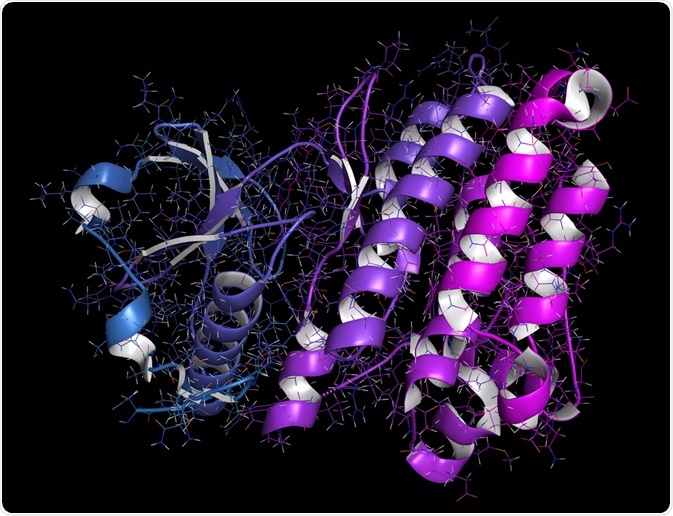Lung cancer is one of the most common types of cancer in the world and accounts for the most cancer-related deaths. Because of this, it is continuously studied for advancements in how to treat and manage it. This involves improved detection, which facilitates better treatment outcomes, and developments in the direct treatment of lung cancer.

Image Credit: SciePro/Shutterstock.com
Advancements in the detection of lung cancer
The earlier lung cancer is detected, the more treatable it generally is. Because of this, much research is being made into new methods to detect cancer early and thereby lower the chance of mortality. One of the methods being studied are computed tomography (CT) scans.
Preliminary research indicates that low dose CT scans can be used on people with a history of heavy smoking to screen for lung cancer. New research is also focusing on whether refined CT scanning can predict the presence of cancer.
CT scans can also be analyzed using machine learning to perhaps pick up on early signs of lung cancer that are not noticed by pathologists. This is showing some promise, with one study showing that an AI program could detect and diagnose two types of lung cancer in CT scans with 97% accuracy, in addition to detecting genetic mutations related to cancer.
Molecular markers are also a focus of earlier detection of lung cancers. This comes in two forms: blood and sputum analysis. Blood samples may contain tumor cells or molecular markers of early cancer, thereby enabling early diagnosis.
Sputum samples can be analyzed for signs or presence of abnormal cells, which may have originated in the lungs or airways. Sputum samples may also have molecular markers that can signal a patient’s need for further analysis.
Immunotherapy treatment of lung cancer
In general, there are five types of treatments available for lung cancer: surgery, radiation, chemotherapy, targeted therapy, and immunotherapy. A combination of these treatment options is frequently used, but researchers are continuously searching for new alternatives to handle cancers in all stages.
Immunotherapy is a big focus of today’s advancements in lung cancer treatment. These often use immune checkpoint inhibitors, which are drugs that block proteins on immune cells and thereby allow the immune cells to target the cancer cells.
The resulting increase in anticancer immune responses by immune checkpoint inhibitors is achieved by targeting PD-L1 and PD-1 proteins. The use of these can differ between patients, as some show tumors with elevated levels of PD-L1 proteins and may, therefore, be more responsive to this treatment than others. However, it can be difficult to identify which patients will or will not benefit from immunotherapy.
Targeted therapy of lung cancer
Targeted therapy involves using treatments that can identify and target cancer cells while leaving normal cells less harmed. Most targeted therapies are protein inhibitors that stop the survival and proliferation of cancer cells.
A common type of targeted therapy is using anaplastic lymphoma kinase (ALK) inhibitors. They target a specific alteration in the ALK gene that causes cancer, and can thus be used on patients with this gene alteration.
Epidermal growth factor receptors are sometimes found at higher levels in cancer cells than in normal cells, which contributes to their growth and proliferation. Inhibitors that target epidermal growth factor receptors are used as targeted therapies against lung cancers.
There are two other genes involved in signaling and cell growth that can be targeted in cancer treatments: ROS1 and BRAF. For ROS1, two approved targeted inhibitors can be used on patients with a specific altered form of ROS1. Similarly, BRAF inhibitors can be used in patients with a specific mutation in that gene.

Image Credit: StudioMolekuul/Shutterstock.com
Advances in lung cancer surgery
Surgery is one of the most common treatments for patients who are considered fit enough to handle it. It can be used for early-stage lung cancer to great effect, especially as less invasive alternatives become available.
This includes, for example, video-assisted thoracoscopic surgery, which allows for less fit patients to use this treatment option and has, in some studies, shown to be more effective than open surgery. Video-assisted thoracic surgery is used to treat small lung tumors, but their use for larger tumors is currently being investigated.
Another type of surgery being championed for lung cancer is robotic-assisted surgery. This involves the surgeon maneuvering surgical instruments using robotic arms. Currently, there is not much evidence to show that this type of surgery is more effective than traditional surgery for lung cancer. It is also generally limited to large cancer centers and is not accessible to smaller hospitals.
Sources
- National Cancer Institute. 2020. Advances in Lung Cancer Research. [online] Available at: <https://www.cancer.gov/types/lung/research> [Accessed 8 August 2020].
- Jones, G., and Baldwin, D., 2018. Recent advances in the management of lung cancer. Clinical Medicine (London, England), 18(Suppl 2), pp. s41-s46.
- American Cancer Society. 2019. What's New In Lung Cancer Research?. [online] Available at: <https://www.cancer.org/cancer/lung-cancer/about/new-research.html> [Accessed 8 August 2020].
Further Reading
Last Updated: Aug 12, 2020